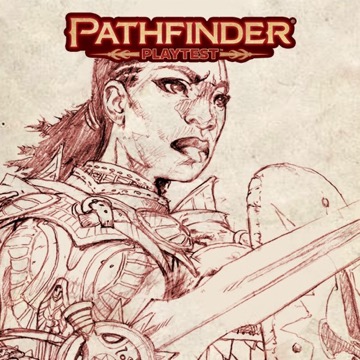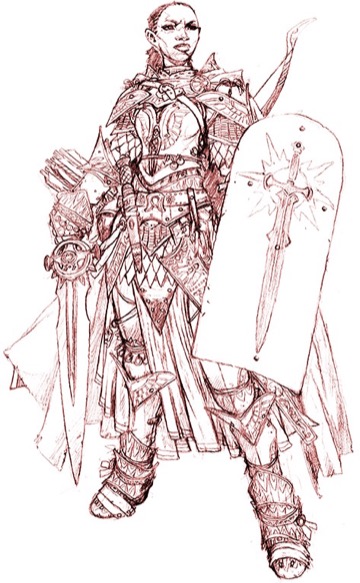All it takes is a cursory browse of the Paizo forums to see that paladins are not just the most contentious class in Pathfinder, they are the most contentious conversation topic. Weeks before we previewed the class, multiple threads with thousands of posts arose in advance, filled with passionate fans with many different opinions and plenty of good ideas. Turns out, the Paizo office isn't too different.
The Quest for the Holy Grail
Early last year, I went on a sacred quest through the office and surveyed all the different opinions out there about paladins. Turns out, almost everyone had slightly different thoughts. But there was one element in common: whether they wanted paladins of all alignments, paladins of the four extreme alignments, lawful good paladins and chaotic evil antipaladins, lawful evil tyrant antipaladins, or even just lawful good paladins alone, everyone was interested in robust support for the idea that paladins should be champions of their deity and alignment. That is to say, whatever alignments paladins have, they should have an array of abilities deeply tied into that alignment.
Since that was the aspect of the paladin that everyone agreed upon, that's what we wanted to make sure we got right in the playtest. But given the limited space for the playtest, we chose to focus on getting that aspect fine-tuned for one alignment, and so in this book we're presenting only lawful good paladins. That doesn't mean antipaladins and tyrants are gone (there's even an antipaladin foe in one of the adventures!) or that the door is closed to other sorts of paladins down the road. We'll have a playtest survey on the matter, we're open to more opinions, and even among the four designers we have different ideas. But we want to focus the playtest on getting lawful good paladins right, first and foremost. If or when we do make more paladins and antipaladins, having constructed a solid foundation for how an alignment-driven champion functions will be a crucial step to making all of them engaging and different in play.
The Code
Tell me if you've heard this one before: My paladin was brought to a court where she was forced to testify under oath to tell the whole truth, by a legitimate authority, about the whereabouts of certain innocent witnesses, but she knows that if she answers the questions, a villain is going to use that information to track down and harm the innocents. It's the "Inquiring Murderer" quandary from moral philosophy set in a way that manages to pin you between not just two but three different restrictions in the old paladin code. Sure, I can beg and plead with the judge that the information, if released, would harm innocents, but ultimately if the judge persists, I'm in trouble. These sorts of situations are some of the most common paladin threads on the forums, and they're never easy.
With the playtest presenting the opportunity, I wanted to analyze the paladin's code down to basic principles and keep all the important roleplaying aspects that make paladins the trustworthy champions of law and good we've come to expect while drastically reducing, and hopefully eliminating, the no-win situations. Here's what it looks like at the moment.
Code of Conduct
Paladins are divine champions of a deity. You must be lawful good and worship a deity that allows lawful good clerics. Actions fundamentally opposed to your deity's alignment or ideals are anathema to your faith. A few examples of acts that would be considered anathema appear in each deity's entry. You and your GM will determine whether other acts count as anathema.
In addition, you must follow the paladin's code below. Deities often add additional strictures for their own paladins (for instance, Shelyn's paladins never attack first except to protect an innocent, and they choose and perfect an art).
If you stray from lawful good, perform acts anathema to your deity, or violate your code of conduct, you lose your Spell Point pool and righteous ally class feature (which we talk more about below) until you demonstrate your repentance by conducting an atone ritual, but you keep any other paladin abilities that don't require those class features.
The Paladin's Code
The following is the fundamental code all paladins follow. The tenets are listed in order of importance, starting with the most important. If a situation places two tenets in conflict, you aren't in a no-win situation; instead, follow the most important tenet. For instance, if an evil king asked you if innocent lawbreakers were hiding in your church so he could execute them, you could lie to him, since the tenet forbidding you to lie is less important than the tenet prohibiting the harm of an innocent. An attempt to subvert the paladin code by engineering a situation allowing you to use a higher tenet to ignore a lower tenet (telling someone that you won't respect lawful authorities so that the tenet of not lying supersedes the tenet of respecting lawful authorities, for example) is a violation of the paladin code.
- You must never willingly commit an evil act, such as murder, torture, or casting an evil spell.
- You must not take actions that you know will harm an innocent, or through inaction cause an innocent to come to immediate harm when you knew your action could reasonably prevent it. This tenet doesn't force you to take action against possible harm to innocents or to sacrifice your life and future potential in an attempt to protect an innocent.
- You must act with honor, never cheating, lying, or taking advantage of others.
- You must respect the lawful authority of the legitimate ruler or leadership in whichever land you may be, following their laws unless they violate a higher tenet.
So let's break down what's the same and what's different. We still have all the basic tenets of the paladin from Pathfinder First Edition, with one exception: we've removed poison from the tenet of acting with honor. While there are certainly dishonorable ways to use poison, poisoning a weapon and using it in an honorable combat that allows enhanced weaponry doesn't seem much different than lighting the weapon on fire. However, by ordering the tenets and allowing the paladin to prioritize the most important tenets in the event of a conflict, we've cut down on the no-win situations. And of course, this opens a design space to play around with the tenets themselves, something we've done by incorporating one of the most popular non-core aspects for paladins...
Oaths
Oaths allow you to play around with the tenets of your code while also gaining mechanical advantages. For instance, the Fiendsbane Oath allows you to dish out near-constant retribution against fiends and eventually block their dimensional travel with an Anchoring Aura. Unlike in Pathfinder First Edition, oaths are feats, and you don't need an archetype to gain one.
Paladin Features
As many of you guessed when Jason mentioned it, paladin was the mystery class that gains the highest heavy armor proficiency, eventually reaching legendary proficiency in armor and master proficiency in weapons, as opposed to fighters, who gain the reverse. At 1st level, you also gain the Retributive Strike reaction, allowing you to counterattack and enfeeble any foe that hits one of your allies (Shelyn save those who strike your storm druid ally). You also get lay on hands, a single-action healing spell that not only heals the target but also raises their AC for a round to help prevent future damage. Combine that effect used on yourself with a raised shield, and you can make it pretty hard for a foe to hit you, and it helps recovering allies avoid another beating.
Lay on hands is the first of a paladin's champion powers, which include a whole bunch of elective options via feats. One of my favorites, gained automatically at 19th level, is hero's defiance, which makes a paladin incredibly difficult to take down. It lets you keep standing when you fall to 0 HP, gives you a big boost of Hit Points, and doesn't even use up your reaction! Leading up to that, you gain a bunch of fun smite-related boosts, including the righteous ally class feature that you saw mentioned in the code. This is a 3rd-level ability that lets you house a holy spirit in a weapon or a steed, much like before, but also in a shield, like the fan-favorite sacred shield archetype!
Paladin Feats
In addition to the oath feats I mentioned when talking about the code, paladins have feats customized to work with the various righteous ally options, like Second Ally, a level 8 feat that lets you gain a second righteous ally. There are also a variety of auras that you can gain to improve yourself and your allies, from the humble 4th-level Aura of Courage, which reduces the frightened condition for you when you gain it and at the end of your turn for you and your allies, to the mighty 14th-level Aura of Righteousness, which gives you and your allies resistance to evil damage. Feats that improve or alter your lay on hands include mercy feats, which allow you to remove harmful conditions and afflictions with lay on hands, up to and including death itself with Ultimate Mercy. And we can't forget potent additional reactions like Divine Grace, granting you a saving throw boost at 2nd level, and Attack of Opportunity at 6th level.
To close out, I'll tell you about one more popular non-core paladin ability we brought in, a special type of power called...
Litanies
Following their mold from Pathfinder RPG Ultimate Combat, litanies are single-action Verbal Casting spells that last 1 round and create various effects. For instance, litany of righteousness makes an enemy weak to your allies' attacks, and litany against sloth slows down an enemy, costing it reactions and potentially actions as well. One of the coolest story features of the litanies against sins is that they now explicitly work better against creatures strongly aligned with their sin, so a dretch (a.k.a. a sloth demon) or a sloth sinspawn treats its saving throw outcome for litany against sloth as one degree worse!
Just as a reminder to everyone, please be respectful to each other. Many of us have strong opinions about the paladin, and that's OK, even if we each have different feelings.
Mark Seifter
Designer






